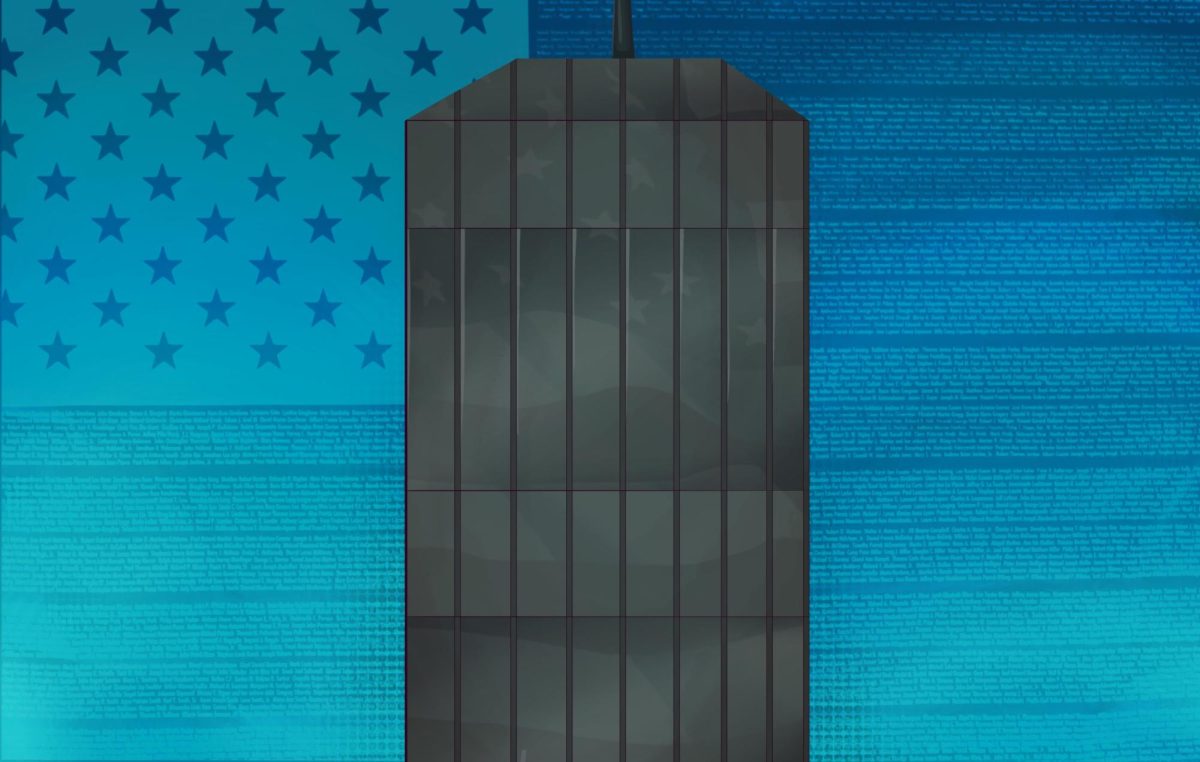“I lived about 10 miles from the Pentagon, and my wife and my daughter were in our apartment when it all went down, then the plane hit the Pentagon, and I wasn’t able to get home to them,” English and U.S. History teacher Robert Tesmond said. “I wasn’t able to call, so it was all very scary.”
Over two decades have passed since the terrorist attacks that happened on Sept. 11, 2001. Yet, their consequences continue to reflect in our society, politics, and global affairs. The events of that fateful day set in motion profound changes that have reshaped America’s role in the world and our everyday lives.
The most immediate and visible impact of 9/11 was on U.S. foreign policy, which started to focus on interventionism and counterterrorism. Launched in response to 9/11, the “War on Terror” led to prolonged military activity in Afghanistan and Iraq, altering the geopolitical landscape of the Middle East. These conflicts reshaped regional dynamics and had far-reaching consequences for global security.
“The most enduring change brought about by the 9/11 attacks may be how American policymakers translated potential U.S. power into kinetic power beyond the military domain,” Duke University professor Peter Feaver said.
This shift manifested in expanding military operations across the Middle East and Africa. Even today, U.S. forces remain engaged in counterterrorism operations in multiple countries.
“It changed the way we interacted with that part of the world. And I think that especially like the invasion of Iraq and basing it on weapons of mass destruction, which were never found,” said Tesmond. “The credibility of our country suffered because of that.”
These interventions continue to shape America’s global position and relationships. According to Foreign Policy, the U.S. dramatically expanded its foreign aid budget to combat terrorism through the development of public health initiatives
“The wars I covered after 9/11 had a common thread: insurgencies, radical groups, and the rise of jihad.” war correspondent Janine di Giovanni said. “The U.S. response to the attacks turned conflicts into wars about terrorism, while at the same time attempting nation-building that largely failed.”
The initial shock to the U.S. economy was severe, with stock markets plummeting and entire industries struggling to operate as they once did. The government’s response was massive increases in defense and homeland security spending.
“The 9/11 wars have cost $6.4 trillion,” Columbia University historian Adam Tooze said. “It’s more than the combined GDP of every country on Earth except the US, China, and Japan.”
This enormous spending has contributed to an increased national debt and diverted resources from other domestic priorities. Additionally, enhanced security measures force Americans to pay more.
“This version of patriotism — consumer patriotism — was on full display after the attacks,” Vox writer Emily Stewart said. “The message from political leaders was that the way for Americans to move past the tragedy and overcome their fears was to spend money and spur the economy.”
Military interventions and an expansion of global involvement have sustained high levels of defense spending, while also influencing trade relationships and economic diplomacy.
A prominent impact of 9/11 is how the attacks fundamentally altered our sense of security and vulnerability, leading to what some have termed a “culture of fear.” As a society, we’ve grappled with an increased amount of anxiety.
“I do think there are residual prejudices and fears, rightful fears that this could happen again,” Tesmond said.
Culturally, 9/11 has left an indelible mark on American art, literature, and media. The events of that day have been explored, dissected, and commemorated in countless works, reflecting our ongoing efforts to process and understand the tragedy
“Especially since, like, the advent of TV, there have been moments of, ‘Where were you when this happened?’,” Tesmond said.
The attacks and subsequent “War on Terror” have profoundly impacted Muslim Americans and other minority communities. The rise of Islamophobia after the attacks challenged America’s ideals of inclusivity and pluralism.
Public fear and anger in the wake of the attacks provided political support for the military. Conversely, prolonged wars and their human costs have made Americans more skeptical of involving themselves in foreign matters.
The emphasis on global cooperation in counterterrorism is closely linked to the economic and cultural impacts of 9/11. International efforts to combat terrorist financing have led to new financial regulations and monitoring systems. Similarly, increased security cooperation has influenced travel policies and border controls worldwide.
9/11’s impact is still prevalent around the world today. While some policies have faded with time, others are ingrained very deeply in today’s society.
The challenge for policymakers and citizens alike is to critically examine this legacy and its ongoing relevance. The lessons America has learned from the 9/11 attacks should be taken into consideration in future foreign conflicts.
“You have to wait until things have passed to really look at history,” said Tesmond. “A failure can be something that eventually is for the good of a country, but it doesn’t always feel like it at the moment. I’m hoping we do learn lessons from it.”






